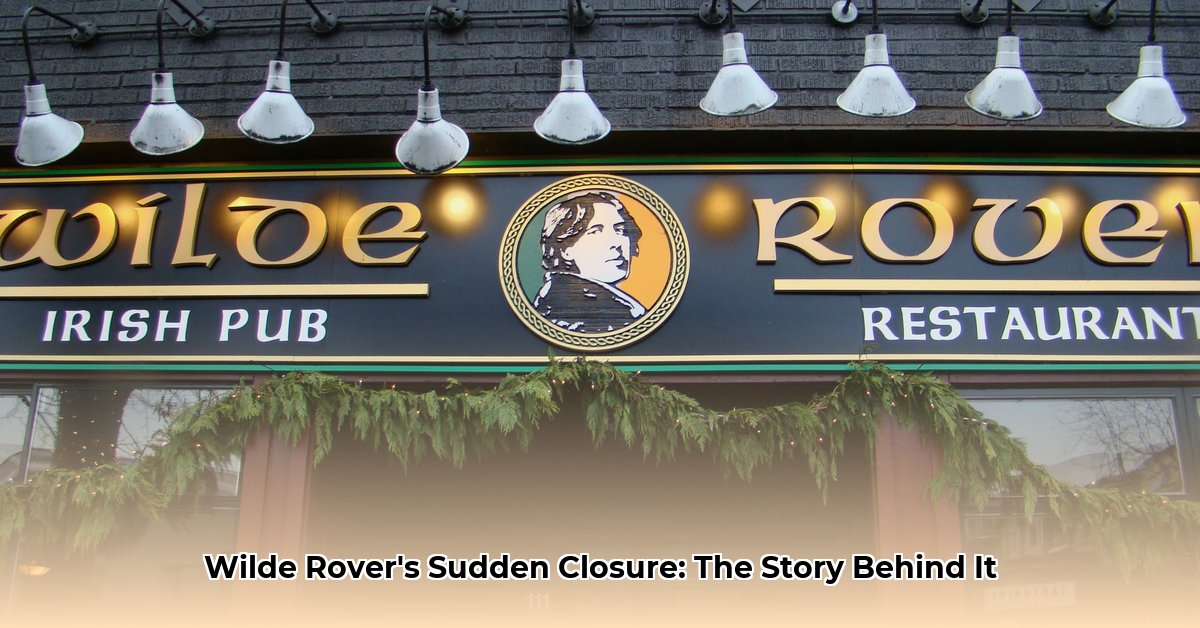
Wilde Rover in Kirkland: A Post-Pandemic Retrospective
The abrupt closure of Wilde Rover, a beloved Kirkland, Washington Irish pub, in January 2024, shocked the community. For sixteen years, it served as a vibrant social hub, renowned for its lively atmosphere, live music, and convivial gatherings. This case study analyzes the factors contributing to its demise, offering valuable insights for businesses navigating economic uncertainty. The closure wasn't simply the loss of a business; it highlighted the fragility of the hospitality industry in the face of unforeseen crises. How could such a successful establishment fail? The answer lies in a confluence of factors, with the COVID-19 pandemic playing a pivotal role.
The Pandemic's Impact: A Devastating Blow
The COVID-19 pandemic delivered a severe blow to the hospitality sector. Wilde Rover, heavily reliant on high-capacity crowds and live music, faced immediate challenges. Initial lockdowns forced complete closure, resulting in a complete loss of revenue. The pivot to online ordering and delivery proved insufficient. The pub's essence lay in its lively atmosphere—a quality impossible to replicate through digital channels. Even as restrictions eased, the pub faced ongoing challenges with fluctuating capacity limits, social distancing mandates, and unpredictable changes in regulations. This constant state of flux created immense financial instability. Did the initial government support programs, like the Paycheck Protection Program (PPP), offer enough relief? For many businesses, including Wilde Rover, the answer was no.
Beyond the Taproom: Unraveling the Financial Fallout
While the specific financial details of Wilde Rover's closure remain confidential, its experience reveals a broader vulnerability among businesses deeply reliant on in-person customers. The pandemic exposed pre-existing weaknesses, exacerbating the strain of balancing expenses with uncertain income streams. The combination of reduced capacity, altered customer habits, and rising operating costs proved insurmountable. The question remains: Could earlier, more robust financial planning and diversification strategies have mitigated the impact? This case study suggests a strong affirmative.
Lessons Learned: Adaptability and Resilience in the Face of Crisis
Wilde Rover's closure underscores the critical need for flexibility and financial preparedness in the hospitality industry. It wasn't solely the pandemic but a convergence of factors that exacerbated pre-existing weaknesses. To enhance resilience, businesses must prioritize:
Diversified Revenue Streams: Exploring online ordering, delivery, merchandise sales (branded merchandise, gift cards), and alternative revenue models (e.g., private event rentals) can buffer against revenue shocks.
Robust Contingency Planning: Developing comprehensive crisis response plans, including financial reserves, alternative operating models (e.g., outdoor seating, reduced menus), and effective communication strategies, is crucial.
Nurturing Strong Community Ties: Building a loyal customer base through consistent engagement, social media interaction, local events, and community involvement fosters customer loyalty and support during challenging times.
Embracing Adaptive Strategies: Responding proactively to changing customer preferences and adapting swiftly to evolving regulations is paramount. Data-driven decision-making and real-time customer feedback are instrumental for survival.
The Wider Ripple Effect: Beyond the Immediate Losses
Wilde Rover's closure had far-reaching consequences, impacting not only its owners and employees but the entire community. The loss of a local hub impacted social interaction, community events, and local employment. The incident served as a potent reminder of the interconnectedness of local businesses and the wider community. How can we mitigate the devastating effects of similar closures in the future? Supporting local businesses actively and promoting policies that foster their resilience are essential steps.
Building a Sustainable Future: Policy and Community Action
The future of the hospitality sector requires proactive measures involving both businesses and policymakers. Local governments can play a crucial role by:
Strengthening Financial Assistance Programs: Revisiting and adapting existing financial aid programs to better address the specific needs of businesses during crises.
Incentivizing Pandemic Preparedness: Providing incentives and support for businesses to build resilience against future shocks.
Promoting Community-Driven Economic Development: Investing in initiatives that foster strong local economies and support locally owned businesses.
The narrative of Wilde Rover's closure should serve as a catalyst for change, prompting businesses to adopt proactive strategies and policymakers to create a more robust support system for the hospitality sector. Only through concerted effort can we build a more resilient future and prevent similar tragedies.
Risk Assessment for Similar Establishments
This table summarizes key risk factors and mitigation strategies for businesses similar to Wilde Rover:
| Risk Factor | Likelihood | Impact | Mitigation Strategies |
|---|---|---|---|
| Pandemic/Health Crisis | High | High | Diversification, reserves, robust health protocols, flexible operations |
| Economic Downturn | Medium | Medium | Cost control, efficient inventory, targeted marketing, loyalty programs |
| Increased Competition | Medium | Medium | Unique selling proposition, brand building, excellent customer service, community engagement |
| Staffing Shortages | Medium | Medium | Competitive compensation, training, positive work environment |
The closure of Wilde Rover is a cautionary tale, providing valuable lessons for the hospitality industry and highlighting the importance of proactive planning and community support in navigating future uncertainties. The memory of Wilde Rover should serve as a reminder of the need for greater resilience and adaptability.